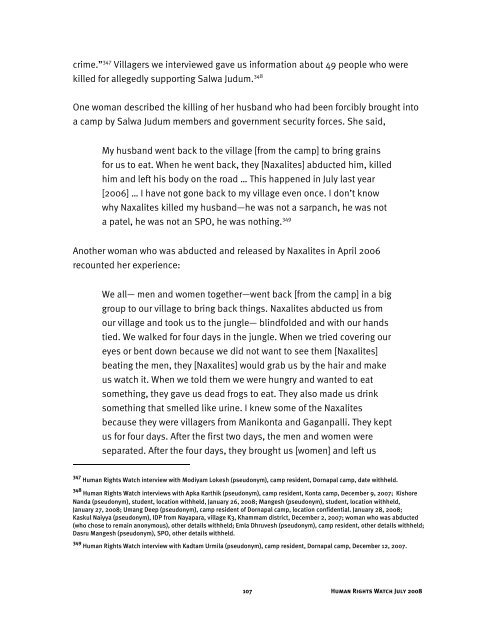âBeing Neutral is Our Biggest Crimeâ - Global Coalition to Protect ...
âBeing Neutral is Our Biggest Crimeâ - Global Coalition to Protect ...
âBeing Neutral is Our Biggest Crimeâ - Global Coalition to Protect ...
You also want an ePaper? Increase the reach of your titles
YUMPU automatically turns print PDFs into web optimized ePapers that Google loves.
crime.” 347 Villagers we interviewed gave us information about 49 people who were<br />
killed for allegedly supporting Salwa Judum. 348<br />
One woman described the killing of her husband who had been forcibly brought in<strong>to</strong><br />
a camp by Salwa Judum members and government security forces. She said,<br />
My husband went back <strong>to</strong> the village [from the camp] <strong>to</strong> bring grains<br />
for us <strong>to</strong> eat. When he went back, they [Naxalites] abducted him, killed<br />
him and left h<strong>is</strong> body on the road … Th<strong>is</strong> happened in July last year<br />
[2006] … I have not gone back <strong>to</strong> my village even once. I don’t know<br />
why Naxalites killed my husband—he was not a sarpanch, he was not<br />
a patel, he was not an SPO, he was nothing. 349<br />
Another woman who was abducted and released by Naxalites in April 2006<br />
recounted her experience:<br />
We all— men and women <strong>to</strong>gether—went back [from the camp] in a big<br />
group <strong>to</strong> our village <strong>to</strong> bring back things. Naxalites abducted us from<br />
our village and <strong>to</strong>ok us <strong>to</strong> the jungle— blindfolded and with our hands<br />
tied. We walked for four days in the jungle. When we tried covering our<br />
eyes or bent down because we did not want <strong>to</strong> see them [Naxalites]<br />
beating the men, they [Naxalites] would grab us by the hair and make<br />
us watch it. When we <strong>to</strong>ld them we were hungry and wanted <strong>to</strong> eat<br />
something, they gave us dead frogs <strong>to</strong> eat. They also made us drink<br />
something that smelled like urine. I knew some of the Naxalites<br />
because they were villagers from Manikonta and Gaganpalli. They kept<br />
us for four days. After the first two days, the men and women were<br />
separated. After the four days, they brought us [women] and left us<br />
347 Human Rights Watch interview with Modiyam Lokesh (pseudonym), camp resident, Dornapal camp, date withheld.<br />
348 Human Rights Watch interviews with Apka Karthik (pseudonym), camp resident, Konta camp, December 9, 2007; K<strong>is</strong>hore<br />
Nanda (pseudonym), student, location withheld, January 26, 2008; Mangesh (pseudonym), student, location withheld,<br />
January 27, 2008; Umang Deep (pseudonym), camp resident of Dornapal camp, location confidential. January 28, 2008;<br />
Kaskul Naiyya (pseudonym), IDP from Nayapara, village K3, Khammam d<strong>is</strong>trict, December 2, 2007; woman who was abducted<br />
(who chose <strong>to</strong> remain anonymous), other details withheld; Emla Dhruvesh (pseudonym), camp resident, other details withheld;<br />
Dasru Mangesh (pseudonym), SPO, other details withheld.<br />
349 Human Rights Watch interview with Kadtam Urmila (pseudonym), camp resident, Dornapal camp, December 12, 2007.<br />
107<br />
Human Rights Watch July 2008
















